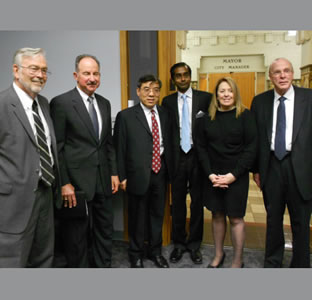UTSA, UT Health Science Center, SwRI, Texas Biomed establish vaccine center

From left are Robert Gracy (UTSA), Mike MacNaughton (SwRI), Guangming Zhong (UT Health Science Center San Antonio), Bernard Arulanandam (UTSA), Jean Patterson (Texas Biomed) and Ken Trevett (Texas Biomed)

From left are Robert Gracy (UTSA), Mike MacNaughton (SwRI), Guangming Zhong (UT Health Science Center San Antonio), Bernard Arulanandam (UTSA), Jean Patterson (Texas Biomed) and Ken Trevett (Texas Biomed)
(April 25, 2012) -- The University of Texas at San Antonio, the UT Health Science Center San Antonio, Southwest Research Institute and Texas Biomed have jointly announced they have together established the San Antonio Vaccine Development Center, a unique partnership that will result in the creation of new vaccines to treat infectious diseases and approaches for quicker and more effective vaccine development.
"It's significant that the city will have a vaccine development center dedicated to safeguarding the community by coordinating effective collaboration between leading health partners that care about people in San Antonio and globally," said San Antonio City Manager Sheryl Sculley.
"As the seventh-largest city in the United States, San Antonio is experiencing solid economic growth and development in 21st century industries like bioscience and health care," said Sculley. "Biotechnology and health care fields contribute $18.9 billion annually to the local economy. This new center will continue to place the city in a position of leadership in the biotechnology and health care industry at the regional, national and global level."
The San Antonio Vaccine Development Center will draw upon the unique and varied expertise of scientists and investigators at the four partnering institutions. Benefits of the partnership include the Southwest National Primate Research Center housed at Texas Biomed, venues for clinical trials and research and development, military partnerships, and federally funded vaccine-related research programs.
The vaccine center will function through two tiers of leadership: a scientific directors team (one representative per institution) and an administrative leadership team (one representative per institution). UTSA Associate Dean of Research Bernard Arulanandam will serve as the UTSA scientific director for the center while Special Assistant to the President Robert Gracy will serve as the center's UTSA administrative director.
The UTSA South Texas Center for Emerging Infectious Diseases specializes in microbiology, immunology, medical mycology, virology and microbial genomics and conducts research with a focus on vaccine development.
The San Antonio Vaccine Development Center's research pipeline includes the development of:
- a vaccine against Chlamydia trachomatis, which causes chlamydia and is the leading bacterial sexually transmitted infectious agent worldwide
- a bio-defense vaccine against Fracisella tularensis, the causative agent of pneumonic tularemia
- a vaccine against Lassa virus, which causes hemorrhagic fever in humans
- vaccine delivery systems using microencapsulation and nanomaterials
Additionally, the center researches Lyme disease, Valley Fever, cholera and other infectious diseases with an eye to creating vaccines to prevent and eliminate widespread outbreaks of those diseases.
Last year, UTSA received funding from the U.S. Department of Defense to establish the Center for Infection Genomics. This support allows UTSA to expand its reach and focus on organisms threatening the well-being of the nation's military and will further support the activities of the San Antonio Vaccine Development Center. The new vaccine center will be managed by a team of four scientific officers and four administrative officers, one of each from the four institutions.
Events
The UTSA Office of Undergraduate is proud to celebrate National Undergraduate Research with an annual event sponsored by the (OUR) featuring students will showcase undergraduate student research and creative endeavors from all disciplines across campus.
Various LocationsDía en la Sombrilla, formerly Fiesta UTSA, is a festival hosted each spring as a part of Fiesta® San Antonio events. Sponsored by Roadrunner Productions, the event features music, food, confetti, games, event t-shirts, and more.
Sombrilla Plaza and Central Plaza, Main CampusFiesta Arts Fair features contemporary art from more than 100 artists from across the U.S., Fiesta favorite foods, drinks, live music by local and regional performers, and a Young Artists Garden providing opportunities for budding artists to learn, explore and express their creativity.
UTSA Southwest CampusJoin the PEACE Center and Wellbeing Services for Denim Day, a day of learning about the importance of consent and why we wear denim on the last Wednesday of the month each April during Sexual Assault Awareness Month. Stop by our Denim Day display to take a photo in front of our Denim Wall, spin the "Is It Consent?" Wheel, and get a Concha or goodie.
Student Union Window Lounge, Main CampusLearn to use Zotero®, a citation manager that can help you store and organize citations you find during your research. Zotero can generate bibliographies in various styles, insert in-text citations and allow you to share sources with collaborators.
Virtual EventThis event is to achnowlege the graduating seniors and induct the new cohart of scholars to our program.
North Paseo Building (NPB 5.140,) Main CampusCelebrate the accomplishments of College of Education and Human Development, College for Health, Community and Policy, College of Sciences and University College.
Alamodome

